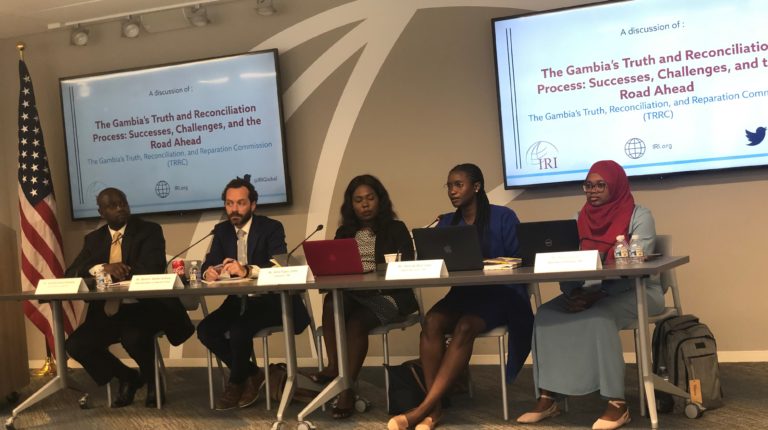Alagie Jammeh. Alagie currently serves as the McCain Institute’s International Rule of Law and Security program intern.
On September 10, 2019, the International Republican Institute, in collaboration with the U.S. Department of State’s Office of Global Criminal Justice, held a panel discussion featuring four members of The Gambia’s Truth, Reconciliation, and Reparations Commission (TRRC). The Commission was created by an act of Parliament of 2017 to investigate the former president Yahya Jammeh and his administration’s twenty-three years of human rights violations. The discussion was centered on the Commission’s successes, challenges, and the road ahead. As the nephew of former president Jammeh—and a recipient of political asylum in the United States after my uncle’s administration threatened to punish me for my support of human rights in The Gambia—I was particularly interested in this discussion.
According to the members of the panel, there is widespread agreement that the former president must answer for his misdeeds. However, there is disagreement among the people regarding how to go about addressing those misdeeds. The Commission acknowledges the challenges it faces in convincing diverse groups of the validity and objectivity of its work. One of the Commission’s main goals is to take the work of the Commission to the people, in their communities, and in the form of a public forum or town hall meeting with no cameras, hear the village’s specific and delicate concerns and address them accordingly.

Among Gambians, there are varying perspectives regarding the work of the Commission. Those still loyal to former president Jammeh are most likely those who belong to his ethnic group, the Jola. About 75 percent of the Jola tribe live in the Western region of the Gambia. For many in the Western region, the TRRC commission is engaging in a “witch hunt” motivated by revenge and meant to punish and humiliate the former president and his government in the name of the rule of law. They see it as a plot by Western governments and organizations to punish Jammeh for not playing by their rules. On the other hand, the majority of Gambians see the Commission as a legitimate body tasked with finding the truth.
The TRRC has uncovered many human rights violations perpetrated by the former regime, namely that opposition members and journalists critical of the president were tortured, imprisoned, disappeared, or killed. In the Gambia and the diaspora alike, many believe that everyone involved in pulling the trigger should face the maximum penalties—capital punishment or life in prison.
Those whom the TRRC finds to be directly involved in the killings of journalists, and innocent civilians are recommended to the Ministry of Justice for prosecution, but others who were merely aware are encouraged to come forward and share what they know. According to the TRRC, the reason the Commission is offering lighter sentences to low-level members of the military and former government officials is to encourage them to come forward and testify. This approach, they believe, will shed the most light on the 23 years of the Jammeh regime.
Every Gambian needs to be able to have confidence in the principle that no one is above the law. For the nation to move forward in unity, the atrocities of the Jammeh administration must be investigated. At the same time, the TRRC must avoid even the slightest appearance of revenge. The Commission must not alienate the Jola from other ethnic groups with overly severe punishment which could be seen as purely motivated by retribution.
Many skeptics have questions about the format and the Commission’s end goals, but after listening and engaging with the members of the Commission, I came to the conclusion that this is the best path forward for The Gambia. This is necessary, in the very least, for victims and their families to heal and see that some form of justice has been done. The Commission is setting good precedent for responding to systematic human rights abuses by ensuring they will be investigated. Perhaps most importantly, this process will begin to allow the citizenry to rebuild faith in their democratic government and its ability to safeguard the promises of liberty and justice for all.